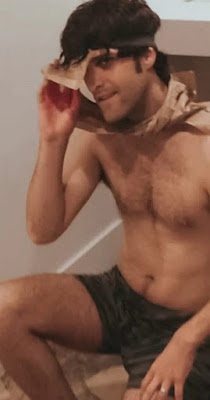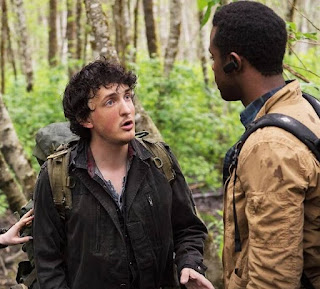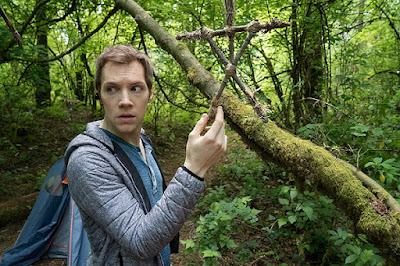Beefcake, gay subtexts, and queer representation in tv and other pop culture from the 1950s to the present
Jul 9, 2022
Saturday Morning Beefcake: the 1990s
In the late 1980s, Saturday morning became cool again. Everybody watched Pee-Wee's Playhouse and Saved by the Bell. For some reason, most gay men preferred Slater (Mario Lopez, right) to Mark-Paul Goesselaer's prettyboy operator Zack Morris.
Between 1993 and 2001, there was a whole lineup of teencoms to watch with your boyfriend and whatever guy you had brought home to "share" the night before. They all had the about the same plot: a group of high schoolers go out for sports, consider cheating on tests, take part-time jobs, date, and start bands. There was always a Zack Morris clone and a Slater clone, plus sundry stereotyped athletes, nerds, cheerleader-type girls, and brainy-type girls.
Boring stuff. But who was watching for the plots?
1. Running the Halls starred blond goldenboy Richard Hillman as the Zack Morris clone who got into constant trouble with the vice-principal. Hillman also had small roles in Detroit Rock City and Teenage Caveman. He died of AIDS in 2009.
2. California Dreams followed Iowa teens to their new home in California (shades of Beverly Hills 90210!), where naturally they started a band. It starred Michael Cade's abs.
Fortunately, Book Circus had a full selection of teen magazines with Michael Cade centerfolds.
3. Saved by the Bell: The New Class was set right at Bayside High, with the vice principal and the nerd Screech still there. It changed teen hunks frequently, but Christian Oliver is probably the best-remembered Zack Morris clone.
You can also see Christian Oliver in the 2012 film Blow Me.
4. Hang-Time was oddly set in small-town Indiana rather than Malibu, and involved basketball rather than surfing. It went through a lot of cast changes, too, with new groups of teen hunks every season. Danso Gordon (left, recent photo) played the Slater clone. Today he performs mostly in evangelical Christian movies like Heaven is Real. I doubt that he would be happy learning that hundreds of gay men in West Hollywood thought that he was hot.
5.City Guys was set at Manhattan High School (apparently there is only one high school in Manhattan), with a diverse cast of two black guys, not just one, plus the Hispanic Al, played by Dion Basco (far left, from the cast of Naked Brown Men).
Jul 3, 2022
"Blair Witch": A Gay Guy and Two Hysterical Girls Fight Whatever Evil Lurks in the Maryland Woods
The Blair Witch Project (1999) was a found-footage movie about some college students who go into the Maryland woods to investigate the legend of the Blair Witch, and end up being killed in a mysterious empty house. One of them does not display any heterosexual interest, and so could be read as gay. The sequel Blair Witch (2016) sends a young man out searching for his sister, one of the students who disappeared. Sister instead of a girlfriend immediately raises a gay or gay-subtext potential.
Scene 1: James (James Allen McCune) reviewing the found footage while Lisa films. "That might be my sister." The searchers never found the house where the students disappeared, but maybe they weren't searching in the right place. A paranormal investigator has discovered a DV with the house, and posted it online.
Peter (who unfortunately is named Brandon Scott, like 1,000 other celebrities) and Ashley come in with groceries, and get the deets: they're going to recreate Blair Witch journey to look for James' sister, who disappeared when he was 8, and Lisa will film them for her class. This time they have much better cameras, drones, and cell phones with a GPS, so no getting lost.
Scene 2: At a nightclub, Lisa interviews the other participants: Peter is James' childhood friend. Ashley met him through dating Peter. Lisa has only been "friends" with him for a short time. Not a girlfriend? Is James gay? I can't tell if he's looking at men or women..
Scene 3: The next morning, they check out the equpiment and go. They drive all day and stop in one of those single-story Mom-and-Pop hotels for the night: boys in one bed, girls in the other.
Scene 4: They arrive at Burkittsville, which used to be called Blair before it was mysteriously abandoned, to interview the guy who found the DV: Lane (Wes Robinson), a frizzy-haired redneck with a giant confederate flag on his wall. But his girlfriend has pink-and-purple hair. Maybe she's LGBTQ. They insist on escorting the gang to the place he found it.
On the way, he gives them a run down of the mysterious happenings in these woods, which "no one likes to talk about." Are you kidding? Paranormal activity is a big tourist draw.
In the 1940s, Rustin Parr brought 8 kids to his house in the woods, and killed 7, becaue the voice of an old woman compelled him to. But it's not the house they are looking for: it burned down. Ghost house!
Scene 5: More mysterious happenings, as they cross a creek: "A girl drowned in this creek. Her mother saw a hand reach out of the water and pull her in."
Ashley cuts her foot on some broken glass or something!
They send the drone up to look for a clearing where there may be a house. Nothing.
Scene 6: Camping for the night. They're not good at assembling the tents. Tell me they've been camping before!
Hot dogs and marshmallows around the campfire, and deets on the Blair Witch: Elly Kedward (no person was ever named in the original): accused of witchcraft after some local kids said she took blood from them, taken out to the woods, and tied to a tree to die of exposure. Then people in town started disappearing. Finally those who remained fled, and the town was abandoned. She still haunts the woods: if you look directly at her, you'll die of fright.
Scene 7: Bedtime: James gets his own tent. Definitely not dating Lisa. He is awakened in the middle of the night by the sound of someone moving around outside. One of your friends getting a midnight snack, dude. Nope - a lot of branches breaking. Suddenly Lisa bursts into his tent. "What the hell was that?"
Lane is missing! James and Talia, Lane's girlfriend, look for him. That's what cell phones are for. Psych! He was just out -- um, peeing. Yeah, that's what we'll call it.
Scene 7: Morning. Lisa spent the night with James! Boo! But there was no smooching scene: maybe she was too spooked to sleep in her own tent. I'm still holding out for James to be gay. There are weird symbols like St. Andrew's crosses hanging from the trees. Evidence that whoever killed the first group is still around; maybe the police will re-open the case!
Lane uses a DV camera, just like the one that took the video in the house. Ulp! But he's too young to be the murderer. And there's rope in his backpack -- exactly like the rope used to make the St. Andrews' crosses!
He explains: they faked the crosses to scare them away, because there's something bad in the woods, and he didn't want them all to be killed. They why did you insist on coming along?
The gang tells them to go home. Lane begs: "It's not safe! Let's all go home!" But they force him and Talia out.
James is upset; he was sure that they would find his sister's murderer, or at least evidence that the police could use. Instead they were just being played.
Scene 8: They head for home. But even with a GPS, they end up walking in a circle, back to last night's campsite. And Ashley's foot is worse: she can't walk anymore. Time to set up camp.
I'll stop the scene by scene there. You know what happens to them, right?
Beefcake: None. This is mostly a "women in distress" movie, with Lisa and Ashley freaking out and being harmed.
Gay Character: James can definitely be read as gay. No heterosexual interest of any sort throughout. However, he's not the focus character. Lisa turns out to be the Last Girl.
Plot Twists: More than I expected.
The Blair Witch: In the original, the threat is never explained. It may not be a person or ghost at all. It detracts from the sense of unease to make it Elly Kedward.
Sequel: Turns out that this is the second sequel to the Blair Witch Project. Another, Book of Shadows, appeared in 2000. Lane mentions the events in one of his stories of mysterious happenings.
My Grade: C. James should have played a bigger role. We can see girls blubbering into cameras in 30,000 psycho-slasher movies; why repeat it here?









